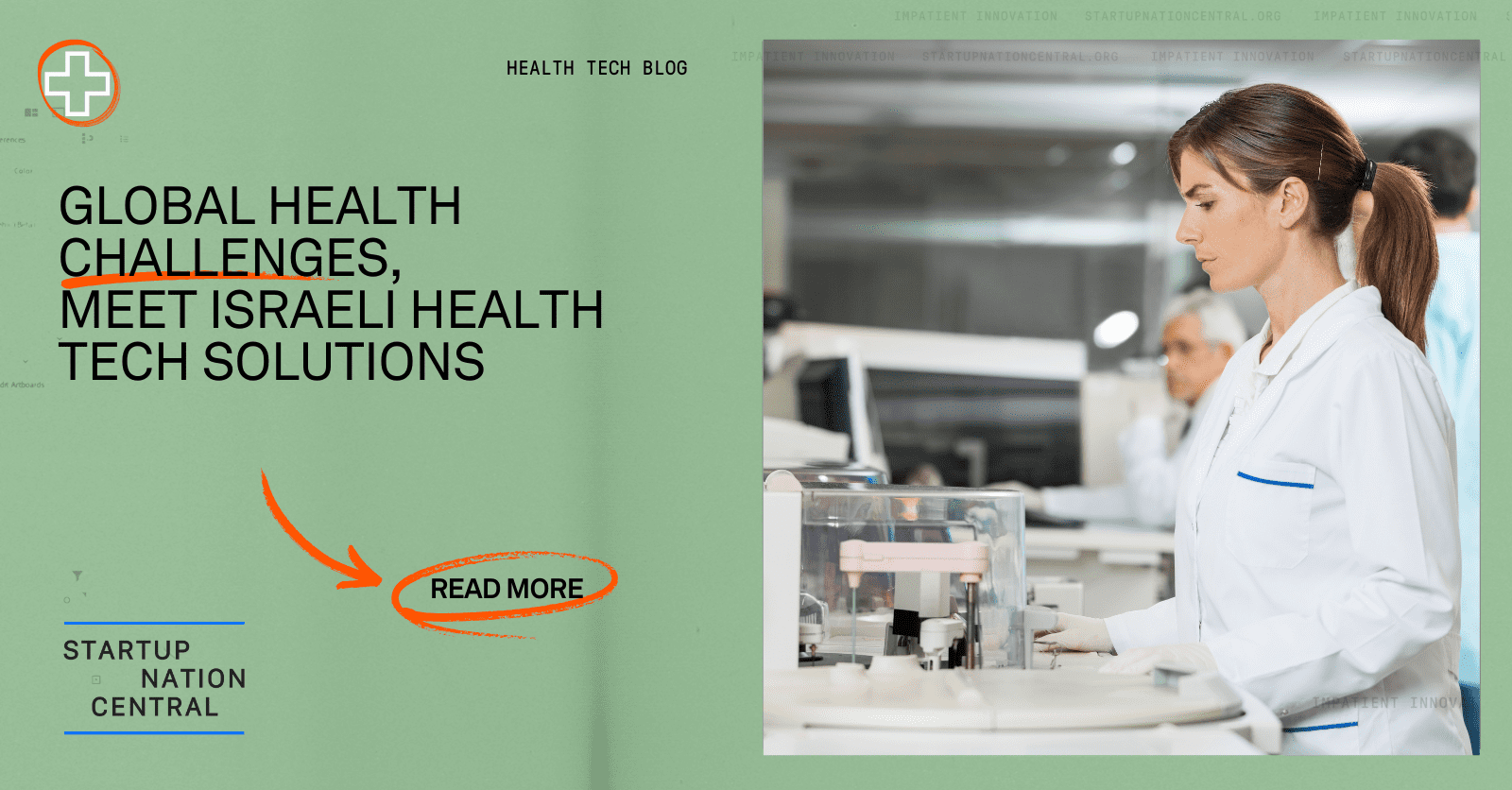As consumer and provider expectations zero in on healthcare that is more personal, reliable, accurate, and data-driven, the global health tech market furthering those goals is projected to grow to over $200 billion worldwide by 2024.
Israel’s digital health ecosystem has become a fertile breeding ground for innovative health tech solutions. According to data from Startup Nation Finder, Israel’s share of global investment increased from 1.5% in 2014 to 4.5% in 2019, and reached $1.5B in investment capital even in 2022’s financially challenging atmosphere (2021 saw $2.6B invested into Israeli HealthTech), Israeli tech is driving global health digitalization.
Contributors to a robust Israel health startup ecosystem include a well-established healthcare system with decades of digital health data, advanced AI and cybersecurity capabilities, and stakeholder support for innovative solutions.
The Trajectory of Global Healthcare: First, Close the Gap – Then, Go Full Speed Ahead
Access to basic medical care may sound obvious, but it is not obvious in many remote areas – including vast population swaths in the United States.
Through telehealth, remote monitoring, and patient engagement technologies, digital health has made tremendous inroads in equalizing access to medical care and improving health outcomes. The same health tech innovations also dramatically reduce the burnout-inducing burden on physicians and medical staff – critical components for positive long-term global health outcomes.
In parallel to equality of care, health tech promises to improve care to new levels of personalization and effectiveness. Machine learning and artificial intelligence can be harnessed to deliver more accurate diagnoses and treatment recommendations, turning databases full of anonymized medical data into a personalized suggestion for which treatment is most likely to work the best in any individual case.
The intersection of AI and the physical sciences also holds the potential for new avenues in drug development that could reduce the need for animal testing and other ethically problematic practices.
The Israel health tech sector can push world healthcare forward in these areas.
Israeli Health Tech: Drawing on Digitalization and Data
A key advantage of Israel’s health tech industry is Israel’s public healthcare system, comprised of four competing HMOs that have been digitally based for the past 25 years. This wealth of medical data – protected by Israel’s data privacy laws and cybersecurity tech expertise – is attractive to global health providers and pharmaceutical companies searching for insights and an R&D sandbox.
Many players in the Israel health startup ecosystem have positioned themselves as partners for multinational health-related corporations that want to leverage comprehensive medical data for their product or service development.
Israel’s HMOs are partially publicly funded and partially privatized. They compete for clients and revenue, prioritizing innovation in services, offerings, and work efficiency. This atmosphere of healthy competition has given rise to numerous health tech innovations designed for the Israeli medical system, but modifiable and exportable to the world.
Getting any Israeli digital health technology to where it can most help the world has its challenges.
Bringing Israeli Health Tech to Market: The Challenges
Some of the obstacles Israeli health tech startups face are common to all startups, such as early-stage access to capital. The groundbreaking idea brewing in an Israeli R&D lab will not make it to market without an investor, but an investor is unlikely to invest in a concept that hasn’t yet made it out of the lab.
Another area where startups tend to stall is in the POC stage. Despite the vast majority (approximately 80%) of POCs in the corporate funnel validating the concept, only 10-25% result in full-scale commercial implementation.
Other challenges, however, are particular to health tech, including human capital supply gaps and market education and adjustment. While Israel has excellent medical personnel – more than enough talent to support the digital health ecosystem – the technological skill gap among medical professionals is a barrier.
Adjusting Israeli technology to different international healthcare systems’ needs, expectations, and regulations is also a significant obstacle to market success.
Overcoming the Obstacles
To get promising Israeli health tech startups over the hurdles, we create connections and business engagements between health tech-relevant Israeli startups and global players looking to access high-quality healthcare innovation or fast, cost-effective R&D and clinical trial validation.
Dr. Iris Adler is a physician with hands-on experience in the ER and on humanitarian volunteer missions serving global hotspots facing socio-political crises. Dr. Adler witnessed the gaps in local and global health systems firsthand, and sees the potential for innovation to address these systemic impediments:

“In my experience, there is a pressing global lack of medical personnel. This human capital gap was exacerbated by pandemic burnout and has persisted, and in fact is worsening. In addition, many countries struggle with providing equal access to healthcare, for example in the United States. It is my firm belief that digitalization and innovation technology can significantly and meaningfully respond to these two major challenges – and that the Israeli ecosystem is equipped to deliver solutions.”
Dr. Iris Adler, Health Tech Sector Lead at Startup Nation Central.
Since the first stage in most relationships between Israeli tech startups and global organizations is a POC, optimizing POC execution has the potential to be a significant factor in raising the export success rate of Israeli health tech.
Healthcare Starts at Home
In addition to facilitating connecting Israeli health tech to the world and propelling access to global markets, Startup Nation Central works with the local medical system to improve efficiency and outcomes, while creating opportunities to upskill its personnel. While the Israeli healthcare system is a natural fit for digital health innovation, many medical professionals lack the digital literacy needed to leverage new, innovative digital health tools.
Startup Nation Central conducts roundtables and panels with Israeli medical professionals and stakeholder organizations to identify challenges, brainstorm solutions and opportunities, and encourage buy-in. The aim is to improve patient outcomes by bringing the Israeli health system fully into the digital era, as Dr. Adler explains:
“Strengthening startups and helping them enter global markets is our mission at Startup Nation Central, but we likewise want to ensure that Israeli tech and innovation are not just exported but are also incorporated into our local health system. Many of the current technologies being developed in the Israeli ecosystem will reduce friction and improve access locally for both patients and medical practitioners. For example, several Israeli startups are developing AI-powered solutions to improve diagnostic precision and speed, while reducing medical error and enhancing individualization for more effective treatment.”
Israel’s digital health startup ecosystem has the potential to transform healthcare at home and around the world. Encouraging the right connections, partnerships, and tech transfers will bring personal, effective, and accessible healthcare for all closer than ever before.
